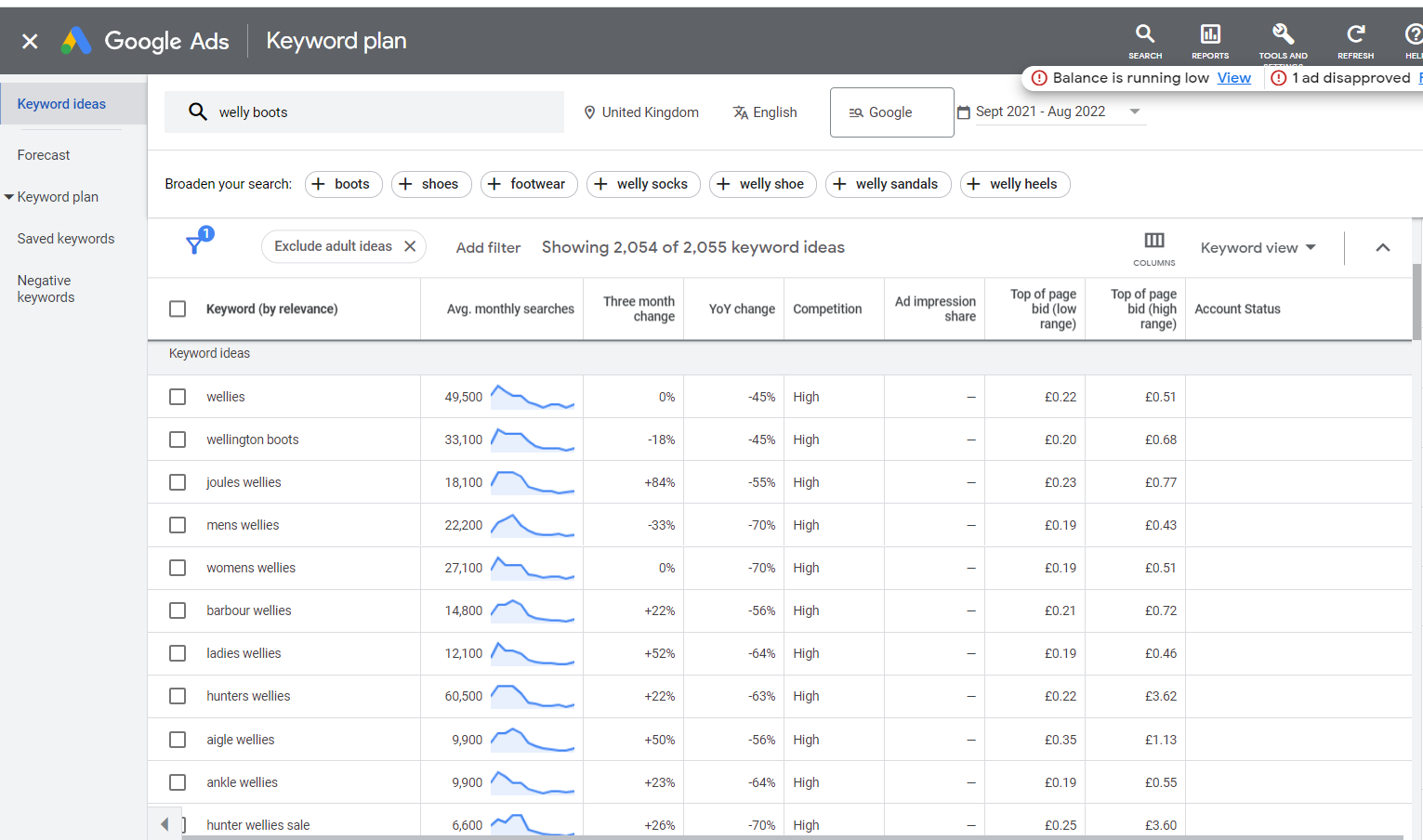When it comes to SEO, choosing the right keywords is essential. Not only do the right keywords help your website rank higher in search engine results, but they also help to attract the right kind of traffic to your site.
If you choose keywords that are too general, you may attract a lot of traffic that is not interested in what you have to offer. On the other hand, if you choose keywords that are too specific, you may not attract enough traffic to make your website worthwhile.
The key is to find a balance between the two extremes. The right keywords will help you to attract targeted, interested traffic that is more likely to convert into customers or clients.
In general, you should consider the following factors when selecting a keyword:
- Relevance: The keyword should be relevant to your business or website.
- Search volume - The keyword needs to have an elevated search volume, so you can get more traffic to your website.
- Competition - The keyword will need to have low competition, so you can rank higher in SERPs.
- Conversion rate - The keyword really needs a high conversion rate, so you can get more leads or sales from your website.
You now know how to carry out keyword research based on the criteria listed above. Here are five tips to help you select the right keywords for your URL.
1 Take A Customer-Centric Approach
When selecting keywords for your website or blog, it's essential to take a customer-centric approach. This means thinking about the words and phrases that your target audience is likely to use when searching for the products or services that you offer.
It can be helpful to brainstorm a list of potential keywords and then use a tool like Google's Keyword Planner to get data on which ones are most popular. Once you've selected a few target keywords, you can start incorporating them into your site's content, making sure to use them in a way that is natural and relevant.
By taking a customer-centric approach to keyword selection, you can help ensure that your site is visible to the people who are most likely to be interested in what you have to offer.
Here's an example; If you're a new photographer in Manchester, it's natural to want your website to rank high for "photographers in Manchester." Unfortunately, competition is fierce; instead, try researching longtail keywords. Using the phrase "Candid photographer in Manchester" dramatically narrows the search
2 Search For Your Competitors' SERP Activity
When you are trying to select the best keywords for your website or blog, one of the best things you can do is to see what your competitors are doing on the search engine results page (SERP). By simply searching for the keywords, you are considering using, you can get a good idea of how they are being used by other websites in your industry.
This will give you a good sense of what keywords are most popular and how they are used. You can then use this information to select the keywords that will be most effective for your site. In addition, by monitoring your competitors' SERP activity, you can stay ahead of the curve and make sure that your site is continually optimised for the latest trends.
3 Visit Google Keywords Planner

If you're looking for help with choosing keywords for your website or blog, one great resource is Google's Keyword Planner. This tool allows you to enter terms or phrases that you're considering targeting, and then shows you how many people are searching for those terms. This can be a valuable guide in helping you decide which keywords to target.
We want to find a keyword that is highly searched and has low competition. The goal is to get as close as possible to the goal. Head over to Google's Keyword Planner now to get started.
Remember, we're only interested in our URLs here, so don't worry too much about all the analytics that Keyword Planner will produce. You can use the results to find a keyword you already have on your shortlist (score) or find a more relevant one.
4 Make Sure Your Keyword Wording Is Perfect
When selecting keywords for your website or blog, it's important to choose wording that is perfect for your audience and your content. Selecting keywords that are too general will result in lower search engine rankings, and choosing keywords that are too specific may not attract enough traffic to your site. The perfect keyword wording is essential for driving traffic to your site and for achieving a high ranking in the search engines.
Your page URL is one of the first places that search engine spiders will look when they're trying to determine what your page is about and how it should rank on other pages. So, it's important to make sure that your URL includes the keyword that you want to rank for. But be careful not to stuff your URL with too many keywords - that will just look spammy. You'll notice that Google will bold the keywords in both the snippet and the URL. It will help attract viewers and increase clicks despite not being at the top.
5 Make Sure You Don't Overuse Keywords
If you're using a keyword too frequently on a page, it may be flagged as keyword stuffing by search engines. This can result in your site being penalised or even removed from search engine results pages entirely. Make sure to use keywords sparingly, and focus on creating compelling, original content to avoid any penalties.
The key is to strike a balance between using keywords enough to be relevant, while also making sure your content sounds natural. In addition, vary the keywords you use throughout your website and in different pieces of content to avoid keyword stuffing.
Lastly,
When it comes to SEO, keyword selection is crucial. The right keywords can mean the difference between ranking on the first page of Google and be buried in the search results.
Selecting the right keywords can be the difference between driving tons of traffic to your website and getting lost in the sea of search results. Spend some time researching and selecting the right keywords for your website and you'll be well on your way to SEO success.




